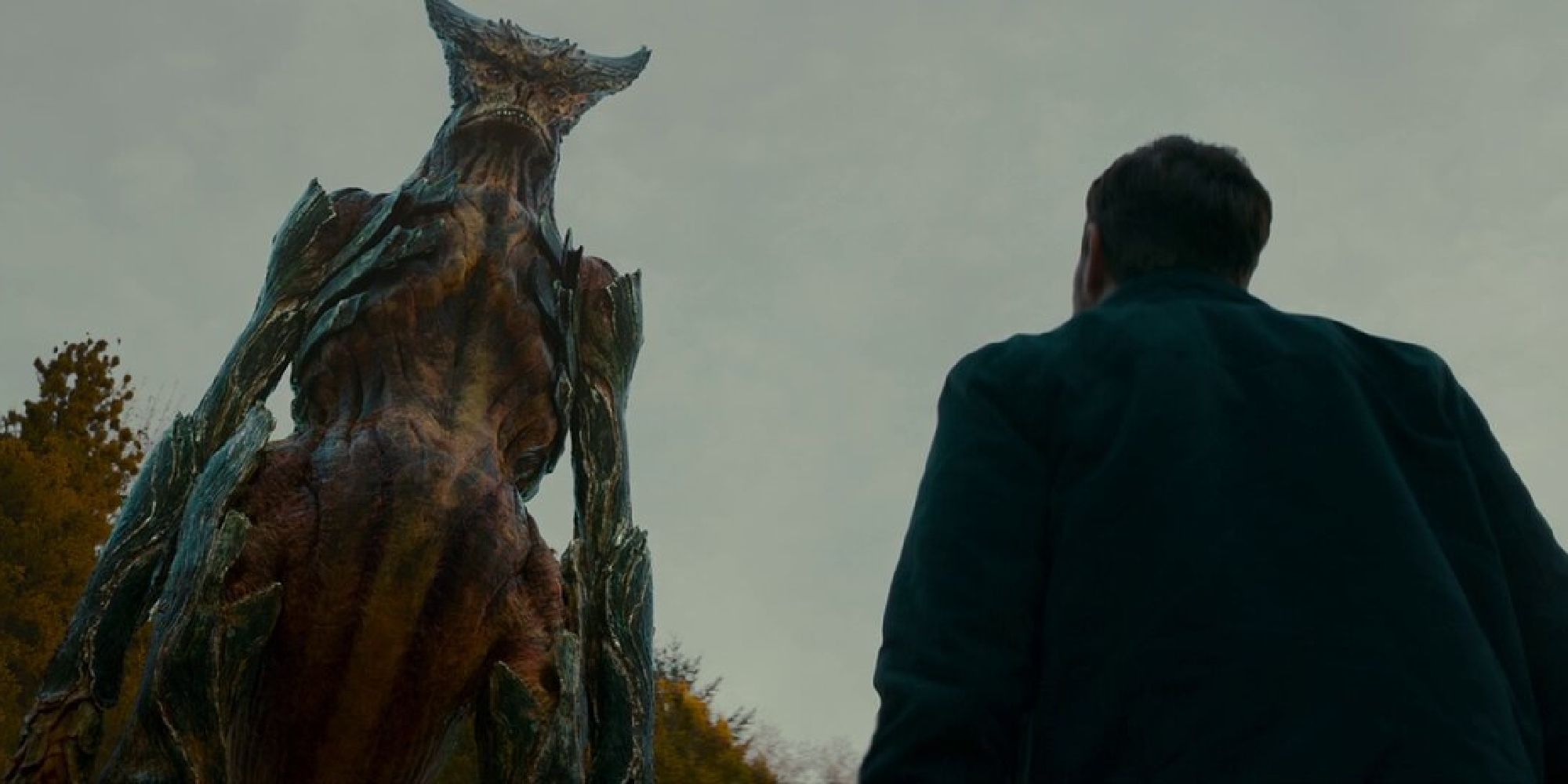As Gloria, Anne Hathaway perfectly sells ‘Colossal’s premise, delivering one of her best performances.
It will be fascinating to see where Anne Hathaway’s career takes her next, as she has skillfully balanced all types of roles throughout her filmography. Whether it’s a romantic comedy like Love & Other Drugs, a gripping emotional drama like Rachel Getting Married, or an extreme genre exercise like Alice In Wonderland, Hathaway’s dexterity is one of the reasons that she has been so successful. However, Hathaway was able to combine her humorous mannerisms, dramatic insight, and aptitude for genre stories into one of her best roles ever: a kaiju. The criminally underrated independent sci-fi dramedy Colossal, which she starred in opposite Jason Sudeiks, turned an outrageous concept into a surprisingly thoughtful, yet humorous spin on the classic monster movie mythology.
What Is ‘Colossal’ About?
Directed by Timecrimes filmmaker Nacho Vigalondo, Colossal stars Hathaway as the unemployed writer Gloria, who breaks up with her boyfriend, Tim (Dan Stevens). Tim has grown tired of Gloria’s unproductiveness, as her struggles with alcoholism have torpedoed any progress in her career. As she seeks a place to stay after moving away from New York City, Gloria moves back to her hometown in Mainland, New Hampshire to stay with her family. Upon walking through an old playground that she frequented during her youth, Gloria realizes that her actions seemingly control a massive kaiju beast that is wreaking havoc in Seoul, South Korea.
Colossal has a seemingly outrageous premise, but surprisingly the nuances of Gloria’s connection with the kaiju are fairly simple and straightforward. It’s a great idea, but what makes the film so special is the way that Hathaway uses Gloria’s monstrous persona as a way to deconstruct her addiction issues. Like the kaiju, Gloria can’t entirely control her behavior, and she becomes aware of the harm that she’s causing to both herself and others. At the same time, Gloria is sardonic, snappy, and endearingly quirky, allowing Hathaway to flex her comedic chops. It’s an incredibly challenging part, but it turns into one of the most dynamic and complex performances of her entire career.
Anne Hathaway Plays Gloria’s Breakdown With Dignity
Alcoholism is not always treated with dignity in cinema, and it’s very easy for comedic films to scoff off these issues in a way that is disrespectful. Films that make alcoholics the butt of a joke are often afraid to genuinely cope with the realities of the condition. At the same time, alcoholism can be the subject of extreme melodrama. Hathaway finds a way to make Gloria’s most endearing qualities, particularly her good heart and creativity, distinct from her destructive capabilities. She’s already a quirky person with a unique output on life, which makes her a great writer. However, she does not attempt to disguise her alcoholic tendencies by trying to make them cute.
The initial scenes of Gloria’s breakup and return home are a brilliant balancing act in tone. Hathaway is able to laugh off her misfortune as inevitable; it makes it clear that she had an issue and will need to move on, but doesn’t show us just how badly she has descended into self-destruction. She’s also able to make us initially feel sympathetic towards Tim; his annoyance with her errant actions seems completely justified. This makes for an interesting twist towards the ending when Tim’s more aggressive and abusive behavior is revealed.
Hathaway’s emotional openness also helps mask the intentions of her childhood friend, Oscar (Jason Sudekis in his best performance ever). Oscar seems to be the only one in Mainland willing to offer Gloria a lifeline; he’s still a simple “small town guy,” but he seems to understand Gloria’s references to the broader world more than the rest of the isolated community. Had Hathaway shown any reservations towards Oscar’s mannerisms, the revelations about his abusive behavior would not be as interesting or haunting. Oscar’s offer to employ Gloria at a bar simply seems like a misguided act of compassion, and Hathaway allows the audience to experience this shock of his actual motivations at the same time that Gloria does.
The Kaiju Way of ‘Colossal’
The film has a simple concept; Gloria’s actions on her childhood playground coordinate with a kaiju monster in Seoul. Anne Hathaway does a great job at navigating the physical comedy involved in this strange parallel. Gloria is so emotionally blunt that she’s not ashamed of seeming goofy in public, so having her play around with her newfound powers is very fun to watch. The moment when Gloria realizes that her monstrous alternate persona is actually causing widespread death and destruction is gut-wrenching; she realizes being a kaiju is not a joke, and that there are consequences. It’s cleverly intertwined with Gloria’s revelations about her alcoholism and the barriers that she’s put in her life.
The film provides Gloria with the perfect way to heal and dig into her past at the same time; there’s a wackiness to seeing her figure out how her powers work, but Hathaway indicates that Gloria is taking a newfound responsibility. Recovering from addiction is hard work, and Hathaway does not ignore that. We slowly learn more about her youth, as she subtly alludes to memories and interests that never left her hometown. The flashbacks are vague enough that Hathaway has room to hint that Gloria is a victim. This creates a more grounded sense of drama when she’s finally willing to admit to herself that Oscar was actually her childhood bully.
Since Hathaway is able to retain the charming side of Gloria’s nature, the ending is satisfying as both a completion of her character arc and a great monster brawl. Oscar discovers that walking on the playground gives him power over a massive robot, and willfully decides to attack the city. The metaphor is fairly on the nose; Gloria has to take ownership of her monstrous side and use it for good by fighting Oscar, and thus the kaiju will defeat the robot. It risks being too easy of a conclusion, but thanks to Hathaway’s commitment, Gloria’s personal confrontation with Oscar is just as exciting as the monster duel in Seoul.
Colossal has such a great concept that it probably would have worked if it was just played for laughs; there’s enough fun things to do with goofballs controlling kaijus that you could fill 90 minutes with jokes. Thanks to Hathaway, Colossal ascends into a moving, humorous, and surprisingly empowering take on self-help. The film needed a central performer to sell the conceit, and Hathaway was perfectly adept to make it work.










